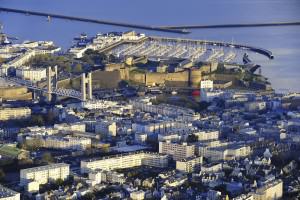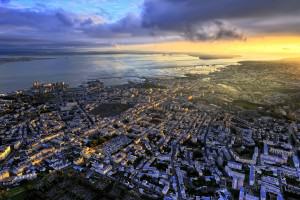Port Cities and Nature
Just as human activities change the face of our planet, the habits of maritime and port city residents have a disproportionate influence on the fate of coastal and marine biodiversity.
We already know that what happens to life on Earth will depend on how people live in cities, but for ports, two factors further leverage their impact. First, they are the most significant global trade and transportation hubs, meaning they can influence and regulate key processes with huge implications on biodiversity. Second, given ongoing urbanization in coastal regions, their urban areas host an increasing population. Thus, their dense populations and high resource consumption patterns can cause offshore and onshore pollution in sensitive ecosystems, but their sustainable governance offers immense opportunities for reducing footprints and set best practices.
It is also clear that local authorities in port cities, as managers, mediators, regulators and stewards of their natural capital at the closest level to citizens, can make an enormous difference for the sustainable management of biodiversity and ecosystem services. The successful transfer and adaptation of their different experiences through decentralized cooperation is challenging but critical for the conservation and sustainable use of marine and coastal resources. In this context, the urban community of Brest, France, set up an international network of around 20 coastal territories, local authorities and their scientific partners, in North and Latin America, Europe and Asia, called the Maritime Innovative Territories International Network (MITIN), dedicated to promote and develop "blue growth", the sustainable economic use of coastal and marine resources, through effective collaboration and exchanges.
What can port authorities do?
The mandates and best practices of city governments with regards to biodiversity have been extensively detailed in this blog and in the groundbreaking "Cities and Biodiversity Outlook", launched at the recent Conference of the Parties of the Convention in Hyderabad, India in October 2012
Decision makers in port city governments, however, can further promote awareness on biodiversity-related issues, and can ensure cost-effective freshwater supply and security through the wise use of wetlands and, increasingly, desalination of sea water (with potential impacts on groundwater salinity and energy consumption). Port city governments can enhance food security by supporting sustainable urban and peri-urban agriculture and aquaculture (which will also reduce coastal and marine pollution), and control urban expansion on sensitive coastal habitats via land-use zoning. They can also protect their cities from the impacts of sea level rise and storm surges by preserving the ecosystems which provide resilience to those coasts (such as estuaries, mangroves and coral reefs), can stimulate development in areas less subjected to these risks, and can participate in early warning systems that minimize actual damage by giving residents and officials time to prepare at critical times.
By applying the right combination of economic incentives and attracting green investments, port cities can ultimately promote the wise use of their natural marine and coastal resources, while also addressing poverty eradication and the economic development of their citizens. Working with retailers and advertisers, as well as with civil society, and implementing sustainable public procurement guidelines, coastal local authorities can promote sustainable consumption. Fish stocks and fisheries are managed and regulated mostly through subnational and local authorities – even when guidelines and quotas are defined by national governments, the enforcement of no-fishing zones and the monitoring of activities and volumes rely heavily of local agencies and authorities.
Port cities also play a crucial role in the prevention, control and eradication of invasive alien species. Shipping can disturb coastal ecosystems by introducing these species through exchange of ballast water and fouling. By establishing treatment protocols for ballast water and ship containers, as well as by introducing biosafety measures, port cities limit the contamination of coastal environment by invasive alien species. Their choices of technologies for urban infrastructure define the ultimate ecological footprint of their cities, their use of regulatory policy tools and voluntary economic incentives can bring greener businesses, and the quality of the urban environment they offer will attract, or not, discriminating citizens to settle, get engaged and pay taxes.
Finally, local authorities in ports will contribute in decisive ways to expand global networks of coastal and marine parks — the 193 Parties to the Convention on Biological Diversity agreed to protect 10 per cent of all coastal and marine areas by 2020 through integrated systems of protected areas and other conservation measures as part of Aichi target 11 — we're at around 6 per cent now and we've barely got another 8 years to reach the deadline!
Brest Métropole Océane and the development of the MITIN network
The urban community of Brest is ranked in the world's top-10 for science and maritime techonologies, with more than 1,800 researchers currently developing cutting edge work. As France's main harbour for the Navy's fleet maintenance and civilian ship repair, the community owns 5 ports, with different functions (military, scientific research, fishing, trade, leisure), and hosts many centres of excellence in scientific and technological research and education, such as IFREMER and Oceanopolis. As such, the local authority of Brest is involved in different European networks, such as the Conference of Peripheral Port Cities and the Conference of Atlantic Arc Cities, promoting maritime issues including marine and coastal biodiversity.
At the international level, Brest métropole océane supported the creation of a new network, the Maritime Innovative Territories International Network (MITIN). Officially launched on July 13th 2012, MITIN is an initiative of Brest Science Park (Technopôle Brest Iroise), supported by Brest métropole océane and several international partners of the local authority. Today, MITIN gathers 20 maritime territories represented by their technology poles, development and scientific agencies, and local authorities, including the US (San Diego), Mexico (Veracruz), China (Qingdao, Shangaï), Argentina (province du Chubut), Vietnam (Haiphong), Italy (Tarente), UK (Southampton), Portugal (Porto), Spain (Vigo), and Quebec (Rimouski). The network aims at promoting sustainable "blue" growth and addresses the sustainable use of marine bio-resources, transportation, maritime safety and security, renewable marine sources of energy, marine instrumentation and information technologies.
A web portal has been created to provide virtual spaces for working groups, practical actions and technology transfer. As president of the local authority of Brest, Mayor François Cuillandre also represents port cities in the Sustainable Ocean Initiative, a platform in the Convention dedicated to information sharing on best practices for the achievement of Aichi Targets 6, 10 and 11 related to marine and coastal biodiversity.
What works and what doesn't
While MITIN is work in progress, we can draw some lessons from its past experience, also to guide future activities. The International Meeting on marine and coastal biodiversity, organised by Brest métropole océane in November 2012, represented an excellent opportunity for Brest partner networks, including MITIN, to reflect on some characteristics of effective decentralized cooperation:
Problems are the same for port cities across the world, but cultural and institutional circumstances are different and the transfer of experiences requires equal efforts from the two sides
The needs of each participating city are different, as are the level of expertise, available materials and suppliers of goods and services. One of the most effective ways to address this is the actual exchange of partners, allowing hosts and suppliers to benefit from a different perspective and further building the capacity of all experts involved, who are then able to work in the context of both cities and institutions. Thus, MITIN identifies priorities, including sustainable uses of marine resources, gathers partners and experts on common issues, offers an information-sharing platform and engages practitioners in the exchange of "know-how". The network can rely on the Summer University, with training sessions suggested by local scientific stakeholders in Brest and supported by Brest métropole océane.
Proposals need to be systematically action-oriented and relevant to each partner
MITIN focuses its cooperation on the concept of Blue Economy, adjusting its context to the needs of each stakeholder group and economic actor to facilitate engagements and commitments. For instance, the implementation of marine protected areas taking into account local economic activities has proved to be an efficient mean to protect and restore marine stocks and habitats. In this context, Integrated Coastal Zone Management and Marine Spatial Planning are well-tested policy tools for public authorities to manage the growth of maritime activities, taking into account fragile or rich marine ecosystems.
More flexible international or multilateral funding mechanisms need to be put in place to support decentralized cooperation
Very few funding mechanisms exist in this domain, limiting the scope and effect of those productive partnerships to the capacity of participating local authorities. In Europe, the Committee of the Regions promotes the role of local actors to develop regions and all around the world some local initiatives are implemented. The involvement of Brest's international partners through MITIN reveals the interest and capacity of action of local actors in issues that have been considered mostly from a national point of view for a long time.
But, to be fully efficient, decentralized cooperation would benefit from the development of international or multilateral funding. We therefore plead in favor of the establishment of more mechanisms, either financed by States or international organizations, for instance based on the model of the European Committee of Regions, not only to promote implementation but also to coordinate the funding and technical efforts of various subnational and local authorities.
Scale up lessons learned at a global level
Regarding new partnerships, it is essential to scale up lessons learned at global level, and to keep doors open for the further engagement of different networks and possible partners. In the case of MITIN, further collaboration between Brest métropole océane, its partner networks and ICLEI – Local Governments for Sustainability, an experienced international network gathering local authorities on sustainable development in urban areas issues, is being examined.
Plans and expectations
To expand its objectives, Brest métropole océane has initiated a partnership with the Secretariat of the Convention on Biological Diversity for technical cooperation and dissemination of experiences to CBD Parties and their subnational and local authorities. This partnership implies both the involvement of local stakeholders (main organizations working on biodiversity) and the invitation to its international and European networks to commit.
As such, this initiative is a model for thematic and regional networks of local authorities supported by the Secretariat and ICLEI within the Global Partnership on Subnational and Local Action on Biodiversity, which also includes the Mediterranean network MediverCities supported by Montpellier. Similarly, this partnership will benefit from the technical support of ICLEI and its pioneering Local Action on Biodiversity programme as a global source of expertise in local governance of biodiversity.
Two events, initiated by MITIN members, and supported by Brest métropole océane, will take place this year: a specific workshop organized by the State of Veracruz dedicated to environmental issues in the Gulf of Mexico in September 2013 and, at the end of October, the city of Qingdao (China) will host a Conference on "Blue Economy", an innovative approach to the management of human production and consumption patterns and the efficient use of natural resources and energy through the use of nature-inspired technologies and solutions that are environmentally beneficial and have wider financial and social benefits. In 2013, Brest métropole océane will also offer to its partners the possibility to attend a summer school university on site.
Finally, Brest and the Secretariat of the Convention on Biological Diversity plan to cooperate on the production of a more detailed study on the role of port cities on marine and coastal biodiversity, building on the recently published Cities and Biodiversity Outlook.
Armelle Labadie-Ouedraogo, Isabelle Lavail-Ravetllat and Oliver Hillel
Brest, Marseille & Montreal


